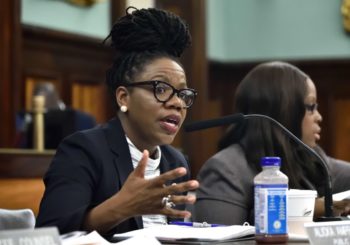
Council Member Alicka Ampry-Samuel/Image Credit: John McCarten/NYC Council
The bill will help protect community gardens and allow them to remain in the City. On March 29, 2020, Introduction 1652-A was enacted into Local Law 46 of 2020. Local Law 46 requires the Department of City Planning to reclassify tax lots currently used as GreenThumb community gardens on the Primary Land Use Tax Lot Output (“PLUTO”) database. The PLUTO database has information on the City’s tax lots. Currently, tax lots with GreenThumb community gardens are classified on PLUTO as “vacant lots.” Under Local Law 46, these tax lots will be reclassified under a new category that indicates that the lot is being used as a community garden. The law, sponsored by Council Member Alicka Ampry-Samuel, was proposed to protect community garden tax lots from being used for development.
GreenThumb is a Department of Parks and Recreation program that works with community members to convert vacant lots into community gardens. There are currently 553 community gardens, both City-owned and privately-owned, that are registered with the GreenThumb program.
To start a community garden under the GreenThumb program, an applicant must find a vacant lot that is suitable for agricultural use. If the lot is city-owned, an applicant must submit a request to use the lot to GreenThumb. GreenThumb will work to get permission to use the lot from the city agency that owns it. If the lot is privately owned, an applicant must provide GreenThumb with written documentation, such as a lease, that shows they have permission from the lot’s owner to use the lot. Once the applicant receives permission, they can start a community garden on the lot. Once the garden is set up, the applicant can register with GreenThumb to have access to free resources such as workshops, garden supplies, and signage.
The Primary Land Use Tax Lot Output (“PLUTO”) database, which is maintained by City Planning and the Department of Finance, has information on a tax lot’s land use category. Land use category information on PLUTO is used by the City or private entities to determine what each tax lot is used for. Tax lots on PLUTO are classified into different categories such as “one and two-family buildings”, “mixed residential and commercial buildings”, and “open space and outdoor recreation.” Tax lots can also be classified as “vacant lots.” The City or private entities consider lots that are classified as “vacant lots” for potential development.
Under Local Law 46, tax lots with GreenThumb community gardens will not be classified as “vacant lots” on PLUTO. The law will create a new “community garden” category on PLUTO and the tax lots will be reclassified under that category. Although the reclassification on PLUTO is not a land use change or a rezoning, it will clarify that tax lots with GreenThumb community gardens are not vacant but used for a purpose. This would make it less likely for the City or a private entity to consider the lot for development.
Local Law 46 was based on a recommended legislative proposal in the Council’s “Growing Food Equity in New York City” report, a report that talks about building food equity in the City. The report talked about the importance of community gardens to the City and noted that community gardens can provide access to fresh produce, can provide access to green spaces, and can improve air quality in the City. It recommended that tax lots with GreenThumb community gardens should not be classified as vacant lots on PLUTO to ensure they permanently remain in the City and not used for development.
According to the City Council Fiscal Impact Statement, it is estimated that the law will have no impact on revenues or City expenditures.
On September 18, 2019, the City Council Committee on Economic Development, Education, and General Welfare held a public hearing on Introduction 1652-A. At the hearing, Council Member Ampry-Samuel explained that the bill is needed to protect tax lots used as working community gardens from potential development.
Sam Bederman, Assistant Commissioner for Community Outreach and Partnership Development for the Department of Parks and Recreation, testified that Parks supports the bill. He stated that Parks believes that community gardens are important spaces for the City.
City Planning did not testify at the public hearing. However, Joe Marvilli, City Planning’s Press Secretary, told CityLand that City Planning is aware of and supports the legislation and will make the changes to the PLUTO database within six months of the bill’s enactment date.
On February 25, 2020, the Committees unanimously voted to pass the bill. On February 27, 2020, the Council unanimously voted to pass Introduction 1652-A. Prior to the vote, Council Member Ampry-Samuel noted the bill’s importance in protecting community gardens from development, especially gardens in low-income communities. She stated that community gardens provide low-income communities with access to fresh produce and green space.
On March 29, 2020, Local Law 46 of 2020 was adopted by the City without the Mayor signing it following unanimous City Council approval. The law will take effect on September 29, 2020, six months after its enactment date.
By: May Vutrapongvatana (May is the CityLaw Fellow and New York Law School Graduate, Class of 2019)

